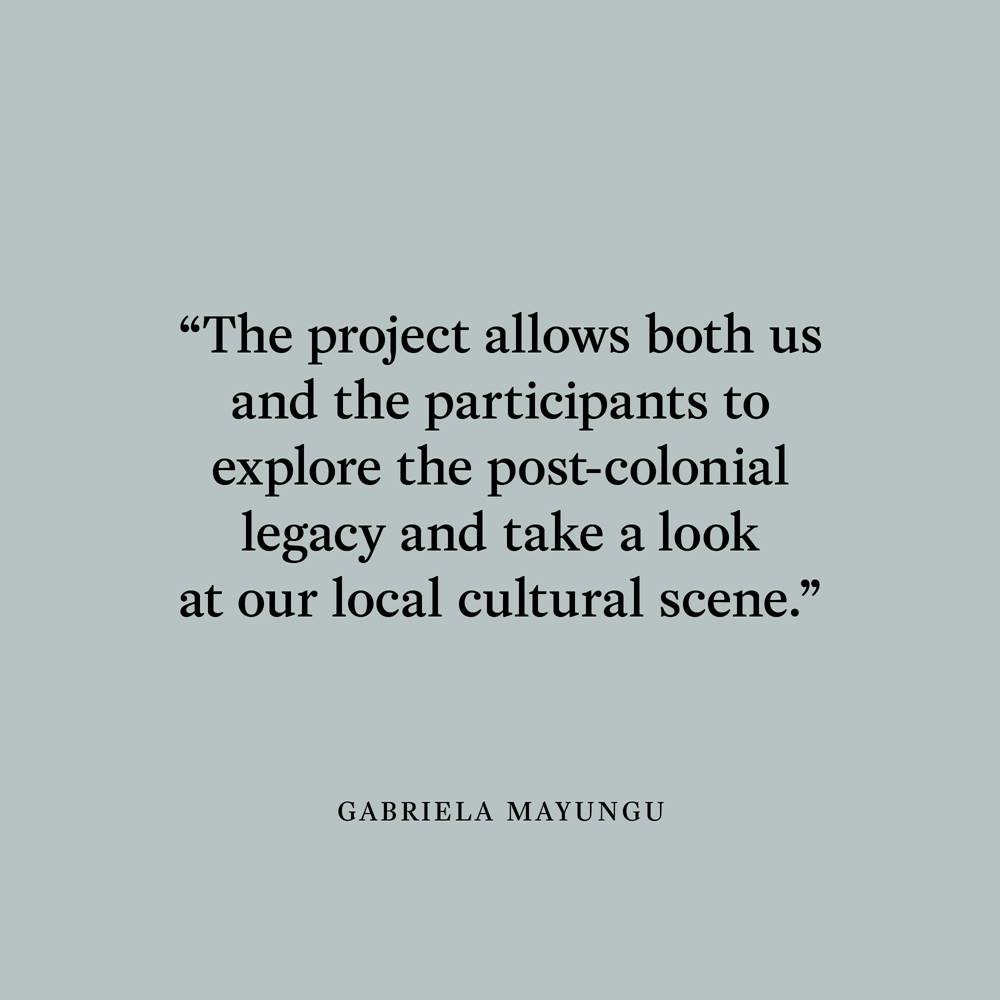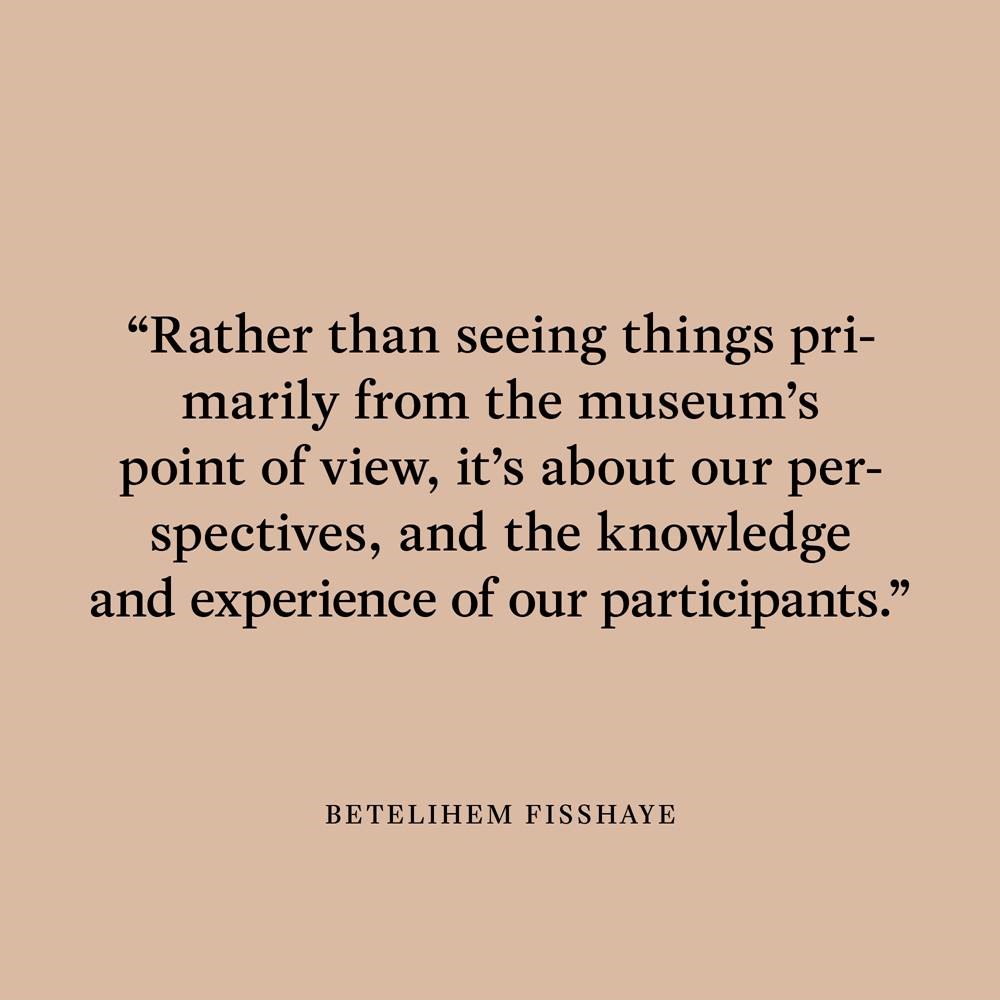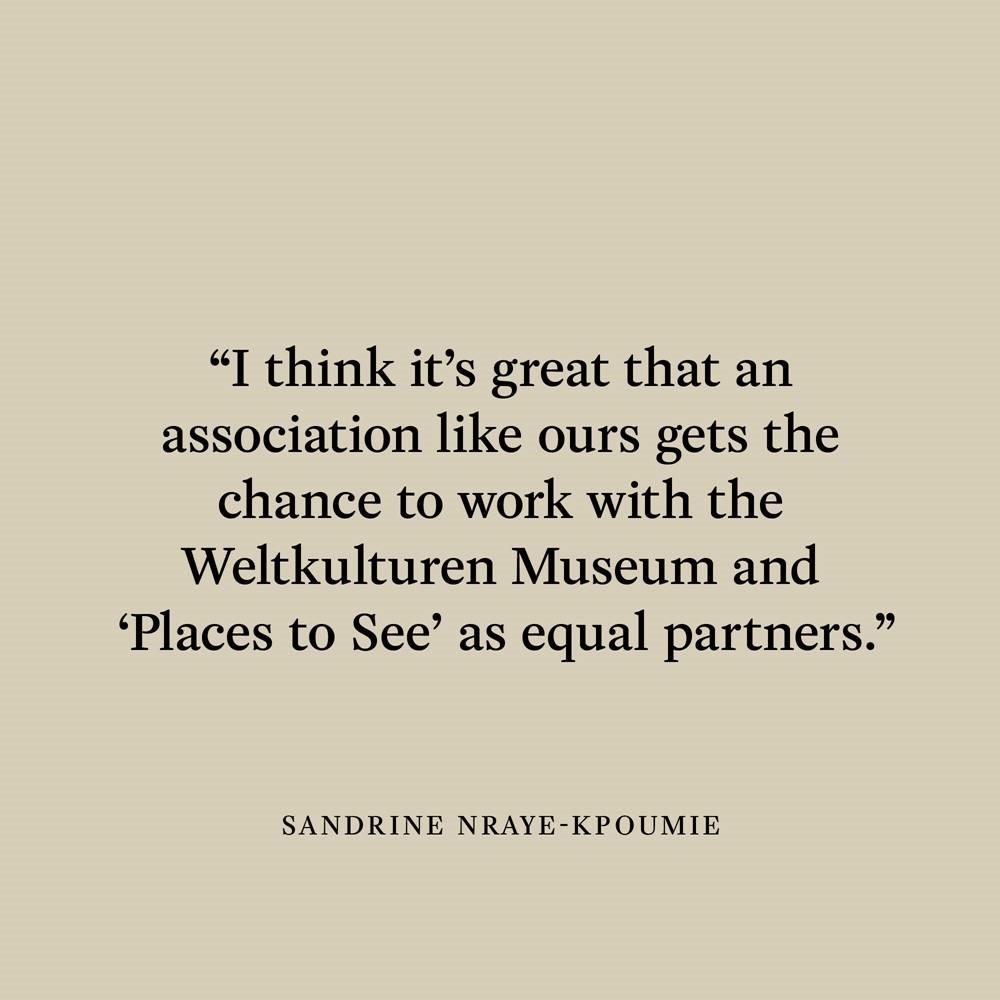POWERFUL VOICES
A conversation about the “Places to See” LAB project with Kone-Netzwerk e.V.
As part of the programme accompanying the exhibition “Invisible Inventories: Questioning Kenyan Collections in Western Museums”, which could be seen at the Weltkulturen Museum from October 2021 to early January 2022, a LAB-project is currently taking place over the course of several months as a collaboration between Kone-Netzwerk e.V. and the Weltkulturen Museum. Women and children from the African diaspora are exploring the themes of “restitution” and the “Invisible Inventories” exhibition through tours, workshops for children and adults and a visit behind the scenes to the museum’s collection depots. “Places to See” is a cultural project run jointly by museums, the Palmengarten botanical gardens, the zoo and the city of Frankfurt’s culture department. This interview with members of Kone-Netzwerk e. V. was conducted by Julia Albrecht, who is responsible for the project on behalf of the Weltkulturen Museum’s education department.
JULIA ALBRECHT: Can you tell me a little about your work for Kone-Netzwerk e. V.?
SANDRINE NRAYE-KPOUMIE: My involvement started when I was a teenager looking after children at the association. Later I helped develop ideas for the programme aimed at children and young people. The themes of empowerment and strengthening cultural identity played a particularly decisive role there. We organised cultural salons, platforms where black teenagers could engage in dialogue, African festivals for children and teenagers, anti-racism workshops, and so on. My involvement in developing the association has grown since 2019, with the emphasis on professionalisation and restructuring.
BETELIHEM (BETI) FISSHAYE: I came to Kone-Netzwerk e.V via Charlotte Njikoufon (co-founder and board member). Charlotte and I got to know each other during a project where we shared our decolonial, pan-African and feminist points of view. Working together in a team made it possible for me to build an additional community where kone, meaning solidarity, is experienced in the truest sense of the word.
GABRIELA MAYUNGU: I’ve viewed myself as a “person close to Kone” since I first met Charlotte Njikoufon and Sandrine Nraye-Kpoumie. In 2019 we organised an empowerment event against racism and violence for children and teenagers. I took part as a speaker. I became a member of Kone e.V. last year and am involved along with my colleagues in the “Places to see” LAB-project.

JA: What makes the “Places to see” LAB-project with the Weltkulturen Museum so interesting for you?
SN-K: I think it’s great that an association like ours gets the chance to work with the Weltkulturen Museum and “Places to See” as equal partners. We’ve been given a huge amount of flexibility and trust in the way we work together. The exhibition and the topic of restitution show that the consequences of colonialism and post-colonialism have multiple dimensions. It’s an issue that bridges the past and the present.
GM: I second that. The project allows both us and the participants to explore the post-colonial legacy and take a look at our local cultural scene. Providing the right conditions, e.g. childcare, makes it possible for women to take part who would otherwise not really be able to get to a museum and take advantage of these programmes.
BF: That’s the way I see it too. A few barriers have already been overcome. These barriers shouldn’t actually exist in the first place. In particular I think that the freedom we have with this project means we can turn it into our own project. Rather than seeing things primarily from the museum’s point of view, it’s about our perspectives, and the knowledge and experience of our participants. But the exhibition itself also provided support because it represented knowledge and perspectives from the African continent.

JA: What kinds of responsibilities have you been involved in so far at the museum?
SN-K: My task was to conduct an online tour around the exhibition followed by a discussion. Apart from that I worked on devising activities for our community in conjunction with some of the women at the association, the Weltkulturen Museum and the programme coordinator of “Places to See”, and I was responsible for communication between the association and our cooperation partners.
BF: Both in terms of creating concepts and as someone conducting education in the museum.
GM: Yes, that applies to me too.
JA: What did you think about taking on the role of educator?
SN-K: Fulfilling the role of educator in a city museum was empowering both for the participants and for me. This kind of setting is only rarely possible. It was different from just giving a talk because strong emotions and painful memories are associated with this topic, but there’s pride too. So it was all the more important to take an educational role for and by the community, in a more protected space.
JA: How did you feel leading a tour around the exhibition?
SN-K: The online tour was a great experience, and what primarily made it so good were the magnificent verbal contributions by the participants. It was lovely to see how the content we communicated triggered not only questions but also a succession of discussions, anecdotes and knowledge transfer from the various African countries of origin. It allowed the museum to come alive online too.
GM: The tour around the museum was structured as a dialogue so there was ample opportunity for people to swap information and discuss things. In particular, the participants let us access stories from their countries of origin that were linked to the theme of the exhibition. We all agree that colonisation has left deep wounds, and we have to come together to tackle the effects of that, both on the African continent and here in the diaspora.
BF: Exactly. I found the stories and exchange of information about anticolonial resistance in places such as Somalia, Kenya and Eritrea so important. It was a daily reminder that these communities always had – and will continue to have – many different forms of resistance.
Bio
Sandrine Nraye-Kpoumie did a bachelor course in sociology at Otto-Friedrich Universität in Bamberg and is currently studying for her master’s degree. Her work for the association Kone e. V. involved developing empowerment and anti-racism programmes for Black children, teenagers and young adults.
Gabriela Mayungu studied sociology and politics in Frankfurt and has a master’s degree in diversity and inclusion. She has worked as an anti-discrimination trainer and as a freelancer in extracurricular education for teenagers. She started working in the intercultural department of Darmstadt students’ union in November 2021. In addition, she is a volunteer at Kone-Netzwerk e. V.
Betelihem (Beti) Fisshaye/ ቤተሊሄም (ቤቲ) ፍስሃየ grew up in Addis Abeba (Ethiopia), Asmera (Eritrea) and Frankfurt (Germany). She studied ethnology and empirical linguistics. Mainly politicised by her lived experience and the associations United for Eritrea (U4E) and the “Initiative für Schwarze Menschen in Deutschland“ (ISD, Initiative of Black People in Germany), she is committed to initiatives and associations that take empowering approaches aimed at BIPoC.
In the “Places to See” LAB-project, interested organisations and cultural institutions get the opportunity to work together closely on a long-term basis. Ideas and experimental formats can be developed and tried out.

